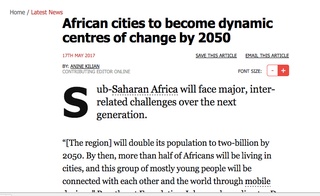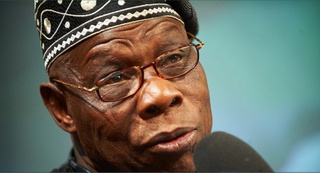News
African cities to become dynamic centres of change by 2050 - Engineering News
80% of Africa's population will be living in cities by 2050, which will become dynamic centres of change.

Sub-Saharan Africa will face major, inter-related challenges over the next generation.
“[The region] will double its population to two-billion by 2050. By then, more than half of Africans will be living in cities, and this group of mostly young people will be connected with each other and the world through mobile devices,” Brenthurst Foundation Johannesburg director Dr Greg Mills said on Wednesday.
Speaking at the launch of the book Making Africa Work, which he co-wrote with former Nigerian President Chief Olusegun Obasanjo, he said that, if properly harnessed and planned for, this was a positive force for change throughout the continent.
The book highlights that 80% of Africa’s population will be living in cities by 2050, which will become dynamic centres of change.
It also focuses on the next generation, Mills said, pointing out that Africa’s youth represents 17% of the global youth population today. By 2050, Africa’s youth will be nearly half of the world’s youth population.
“However, lots of young people gathered together is not a recipe for political stability,” he said.
He noted that, without economic growth and jobs, this could prove to become a political and social catastrophe.
“Old systems of patronage will no longer work because of population increases,” he said.
Mills added that if leaders want to remain in power, they will have to promote economic growth in a more dynamic way.
Obasanjo, meanwhile, said leadership and governance needed to be properly applied in Africa if the continent wants a balanced and growing economy.
“Leaders on the continent have done a few things right, and we are continuing to do them right. The book highlights what we think has been done right in Africa,” he said.
Obasanjo added that the book pointed out the issue of peace and security on the continent, which, along with the integration of an African economy, is fundamental for growth.
“If [African leaders get] this right, along with practicing good governance and leadership, I believe the story of Africa will be different at the end of this century than what it is now,” he said.
Mills noted that the book was meant for the “next generation” of Africans and said that it set out questions and sought answers through policy choices.
He highlighted that it does not dwell on "history or conspiracy theories", but rather focuses on the future and the choices that lie within the grasp of Africa’s citizens.
“It also highlights [that Africans] should accept responsibility. It looks at jobs and skills deficiencies on the continent. We try to understand growth through the past decade, where commodity prices have increased,” he said.
Mills stated that the book also proved the link between democracy and development.
“We researched the last 25 years of development and realised that democracies grow faster,” he said.
The article was published by Anine Kilian on Engineering News.

